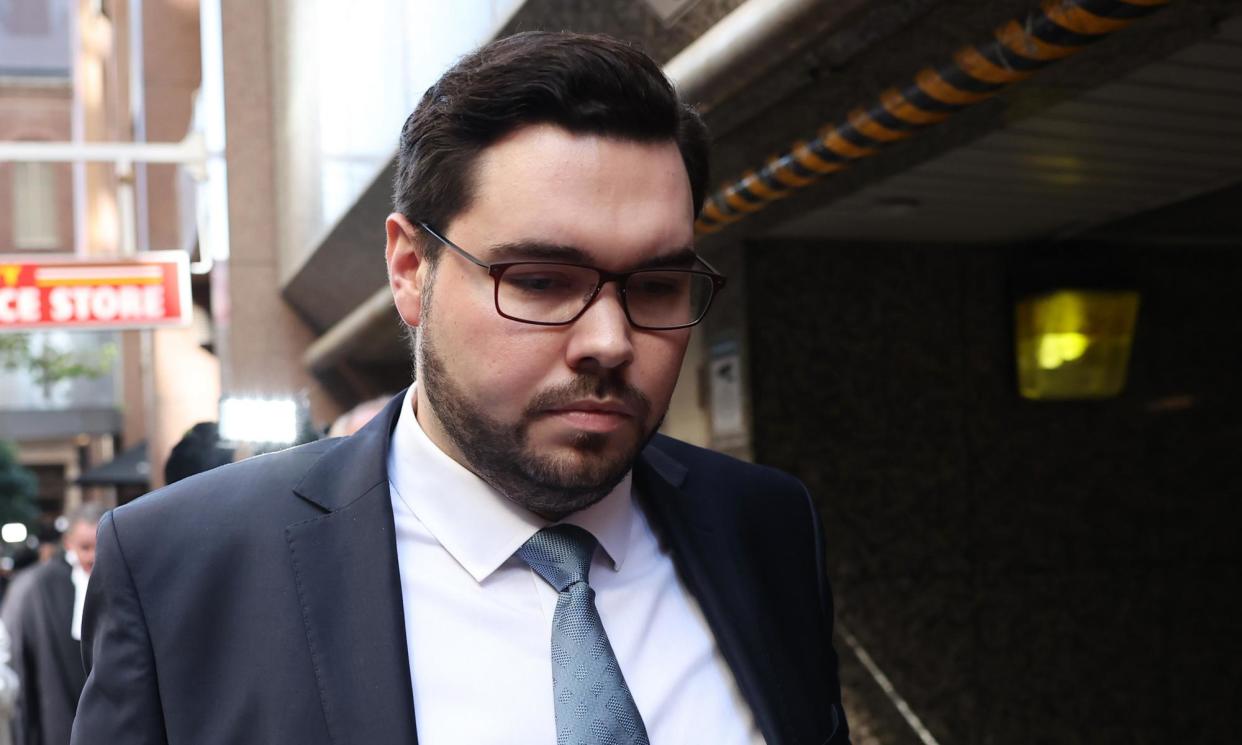Bruce Lehrmann should pay Ten’s entire legal bill after ‘deliberately wicked’ decision to sue, network says

Bruce Lehrmann should pay all Network Ten’s legal costs because suing The Project for defamation was “deliberately wicked and calculated” and an abuse of process, Ten has told the federal court.
The former Liberal staffer lost the defamation case he brought against Ten and Lisa Wilkinson, with Justice Michael Lee finding that on the balance of probabilities Lehrmann raped Brittany Higgins on a minister’s couch in Parliament House in 2019.
Legal experts have estimated the bill for Ten and Wilkinson’s legal counsel alone would be $8m.
Related: How Justice Michael Lee untangled the Higgins-Lehrmann ‘omnishambles’
By all accounts Lehrmann is jobless, homeless and lacking in significant means to pay Ten’s costs, so having successfully defended the case, the network could still be saddled with the bill.
On Tuesday the federal court released the parties’ submissions on costs, which Lee will consider ahead of a hearing on costs scheduled for 1 May.
Ten told the court that Lee found Lehrmann would have known when he filed for defamation “that he had raped Ms Higgins”.
The submission, prepared by Dr Matt Collins KC, argued it was an abuse of process because Lehrmann came to the federal court seeking substantial damages when he knew the allegations he complained about were true.
“In summary, Mr Lehrmann brought this proceeding on a deliberately wicked and calculated basis,” Ten said.
“He put Network Ten to the cost of defending this proceeding, which can be, with the benefit of hindsight, described as a clear abuse of process aimed at concealing the truth that Mr Lehrmann raped Ms Higgins.”
“In the hope of rehabilitating his reputation on the false basis that he had not sexually assaulted Ms Higgins, Mr Lehrmann engaged in an abuse of the court’s processes, ran a case based on positive falsities, and put Network Ten to the cost of defending a baseless proceeding.”
Ten has submitted that Lehrmann pay all its legal costs, known as indemnity costs.
“Given the subject matter of the proceeding and the success of the substantial truth defence, the seriousness of such conduct cannot be overstated. It follows in our submission that Network Ten is entitled to be reimbursed for its costs of defending the proceeding on an indemnity basis.”
Ten revealed it had made a “walk away” offer to Lehrmann to settle in August 2023, before the trial began, on the basis that no admissions would be made by either side and no money change hands.
The network said Lehrmann’s rejection of the offer was “unreasonable in the circumstances” and meant the court should make an indemnity costs order, meaning Lehrmann must pay all the costs incurred.
The network also argued the Ben Roberts-Smith v Fairfax decision in a previous defamation action had set a precedent for an applicant being ordered to pay indemnity costs because they abused the legal process in bringing the claim.
Wilkinson, a former Project presenter, filed a crossclaim against Ten over a dispute about payment of more than $700,000 in legal costs and won, so she will be for the most part covered by Ten.
On this matter Ten said it accepted liability for “part of her costs incurred in defending the proceeding” if Lehrmann was unable to pay them.
However, if the presenter incurred costs in an “unnecessarily duplicative or wasteful manner”, Ten believes it should not have to pay.
In Lehrmann’s submission he accepted that because of the Ben Roberts-Smith case it was open to the court to order him to pay the costs of the respondents on an indemnity basis.
However, he asked Lee to consider whether he should be compensated for the failure of Ten’s qualified privilege defence.
Because Lee found that The Project made “fundamental missteps” in its journalism, the applicant should be compensated “for the time and expense in having to establish that the qualified privilege defences were bound to fail”, the Lehrmann submission argued.
In Wilkinson’s submission, her legal team said Lehrmann chose to single her out and sue her individually and the federal court later agreed it was reasonable for her to engage her own legal team, Sue Chrysanthou SC.
“[Wilkinson] has not engaged in any disentitling or unreasonable conduct in incurring the costs of her own lawyers separate to those engaged by the first respondent,” the submission said.
It is open to Lehrmann to appeal against the judgment, but Lee said if he were to win on appeal his damages would only be $20,000 “because he is only entitled to be compensated for the reputation he deserves”.
Peter Bartlett, a partner at MinterEllison, a defamation expert and the lead solicitor for Nine in the Ben Roberts-Smith trial, has estimated Ten’s bill to be $8m because the network was paying for three firms of lawyers.
“The Ben Roberts-Smith case, for example, ran for 110 days and the costs were some $30m,” Bartlett told the Guardian after the judgment.
Lehrmann also faces potential prosecution by the ACT after he was found by Lee to have breached a Harman undertaking when he leaked material he received in his criminal trial to Seven for its Spotlight program.


